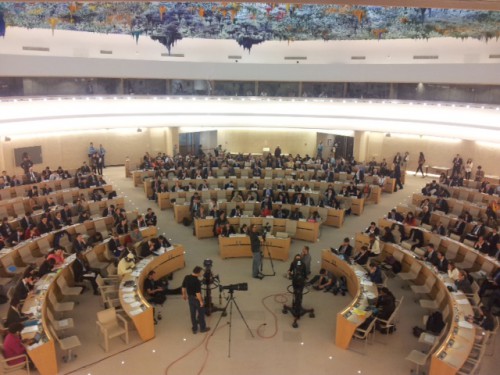17th March 2014 Geneva, Switzerland
Shrinking Space
Human Rights Council sessions are always tough but this one feels particularly lacerating. As we reached the midway point on Friday evening there were some desperate looking faces heading towards the exits, including my own.
The impact of several weeks of negotiating human rights at the UN is physically demanding, mentally exhausting and emotionally draining. It’s what I’d imagine a family camping holiday in the north of England in a small tent with the in-laws would be like for my wife.
That’s not to say that a life spent in diplomatic circles is without its attractions. One of the things I most enjoy about spending time at the UN is that it’s a great place to receive an insult. Diplomats seem able to find ever more creative ways of casting a personal barb your way while leaving some leeway to let you convince yourself it might have been a compliment.
This week I overheard someone telling a badly dressed colleague that she really knew how to push fashion to the limits. And my Egyptian opposite number left me similarly befuddled recently when he called me the Ryan Giggs of the Human Rights Council. I wasn’t sure if he meant a successful long-standing professional, or the greying guy that can’t bring himself to stop even after 25 seasons.
There’s been much consternation this session about the UN’s curious choice of timing to refurbish the Serpentine coffee lounge. Almost all the things that make a difference at the UN are decided away from formal meetings and the Serpentine is the key venue for brokering deals as well as providing the sleep deprived masses with their caffeine fixes and sugar highs. If we end up with more voted resolutions than usual this year I’ll be putting it down to the lack of available seating.
Many of the Council’s Special Procedures (or independent experts for those unfamiliar with UN-speak) are standing down after this session and several made their final statements to the Council this week. The Special Rapporteurs generally do an excellent job under tough conditions. Their work is unpaid and the resources the UN has to support their activities are increasingly thinly spread. This is not helped by an ever growing demand for more experts to be set up which is now putting the system under unsustainable strain.
There are no easy answers. Nothing in the UN ever seems to stop as everyone believes the mandate they created is the most important. States are at least beginning to realise that the current set up can not carry on but it will be crucial to find ways to address this without hampering human rights protection.
The outgoing Special Rapporteur on Human Rights Defenders Margaret Sekaggya left on a particularly sombre note. In her statement to the Council she said that during her 6-year tenure, she had seen the space for civil society and defenders visibly shrink in many parts of the world. She raised particular concern about the impunity which often prevails for arrests, attacks, torture, disappearances, and killing of human rights defenders and their families.
She said states were developing increasingly sophisticated ways to impede the work of defenders, including the misuse of the legal and judicial systems, and the stigmatisation of their public activities. The outcome was not just that individual human rights defenders were endangered but that such acts generated a climate of fear in society at large.

The week ended with the chilling news that Chinese human rights activist Cao Shunli had died in a prison hospital. Cao had called for greater civil society participation in China’s preparation for its Universal Periodic Review last year and was arrested at Beijing airport last September on her way to Geneva for a human rights training course.
Credible sources have reported that she was denied medical treatment for most of her 6 month detention despite repeated pressure from her family and her lawyers. NGOs are now calling for the Council to speak out and support an investigation into her case. My condolences to her family and friends.
Working in Geneva it can be easy to forget how real the risks are for those working directly on human rights issues in their countries. But it is the responsibility of those at the Council not to lose sight of this and to do what we can to help protect the space human rights defenders need to operate, wherever they work.